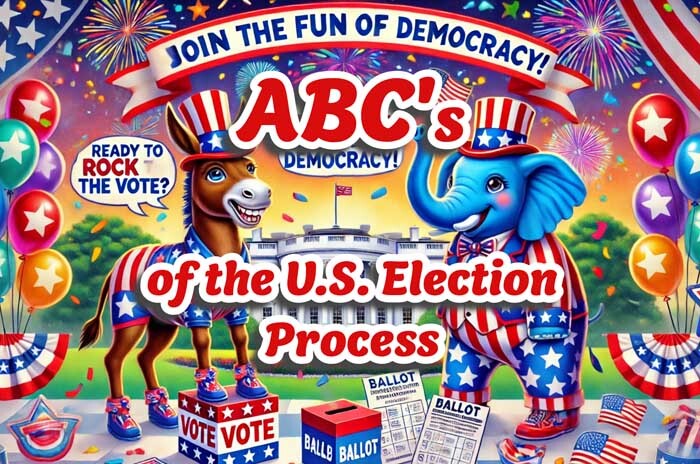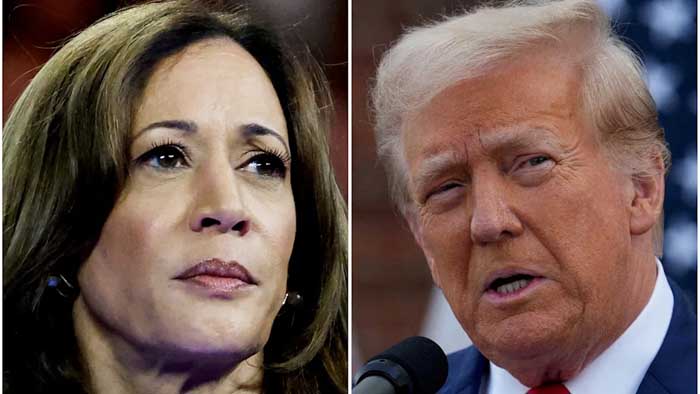
Posted by - News Staff![]() \
\
September 19, 2024 \
Filed in - 2024 Election \
2024 US Election Donald Trump vs Kamala \
2.8K views \ 0 reviews
DLNews US-Election:
A - Inauguration
Welcome to the grand spectacle of inauguration! Every four years, on January 20, a fresh-faced president takes the stage to begin their term. Picture this: they raise their hand, perhaps on a well-loved Bible, and solemnly promise to uphold the Constitution. Cue the applause! The event is attended by the outgoing president (who’s probably relieved to hand over the keys), Congress members, and a gaggle of VIPs. It’s democracy’s version of a Hollywood blockbuster!

Current Vice-President Kamala Harris and Former President of the USA Donald Trump.
B - Calling the Race
Lights, camera, action! The media struts in as the stars of the election night show. They’re calling the race—sometimes before all the votes are counted! If they say it’s "too close to call," it’s like a nail-biting cliffhanger in a soap opera. And if they announce it’s "too early to call"? Well, that’s a polite way of saying, “Hold your horses, folks!” Their proclamations set the stage for a wild ride in the political drama.
C - Democratic Party
Meet the Democratic Party, a vibrant collection of progressives and liberals who are generally all about social justice and making the world a better place. Founded way back in 1792, they’ve had a few makeovers—kind of like that friend who keeps changing their hairstyle but is always fabulous. Think urban sophistication and a love for inclusivity. Notable Democratic stars include FDR and Barack Obama, who brought hope and change to the political stage.
D - Electoral College
Now, let’s talk about the Electoral College—no, it’s not a place you go to get a degree in politics. Instead, it’s a quirky system where 538 electors decide who becomes president. Each state gets electors based on its population. With its sun-soaked beaches, California has 55 electors, while sparsely populated North Dakota has just three. It’s like a party where the biggest states get the most cake!
E - Winner Takes All
In most states, the “winner takes all” principle means the candidate with the most votes snags all the electoral votes—like winning the whole pie instead of just a slice! This makes swing states the hot spots of elections. Candidates campaign like it’s a popularity contest at school, trying to charm their way into the hearts of voters in places like Florida and Ohio.
F - Lame Duck
Ah, the lame-duck phase! It’s that awkward period between the election and inauguration when the outgoing president can feel like a party guest who’s overstayed their welcome. While they may have a few tricks left up their sleeve, their influence is dwindling, leading to a focus on legacy-building and handing off the baton (or the gavel, in this case).
G - Party Conventions
Party conventions are like political pep rallies where party members gather to cheer on their chosen candidate. They’re often filled with passionate speeches, catchy slogans, and a whole lot of excitement. The 2024 conventions were the ultimate showdown, with delegates strutting their stuff and drafting a platform that outlines the party’s goals.
H - Oval Office
The Oval Office, the president’s swanky workspace, is where the magic happens. This iconic room has seen history unfold, from landmark decisions to heartfelt speeches. Each president puts their personal touch on the decor, but the Resolute Desk—a gift from Queen Victoria—remains a cherished constant. It’s like the family heirloom that ties everything together but way more powerful!
I - Party Symbols
Ever wonder why the donkey and elephant are the party mascots? The donkey was adopted by the Democrats in the 1820s when Andrew Jackson’s opponents called him a “jackass”—but he turned it into a badge of honor. The Republicans snagged the elephant thanks to political cartoons, portraying it as strong and noble. These symbols have become iconic, reminding us that even politics can be a bit whimsical!
J - Presidential Election
The president serves as the head honcho of the nation, with a four-year term to leave their mark (or perhaps some glitter). They can only be re-elected once—unless you’re Franklin D. Roosevelt, who fancied three extra terms. The race is a whirlwind of campaigning, debates, and primaries, culminating in the grand election showdown that captures the nation’s attention.
K - Republican Party
Founded in 1854, the Republican Party initially rose to prominence by standing against slavery—now that’s a dramatic origin story! They’ve evolved into champions of conservative values and the free market, with strong bases in rural areas. Think of them as the party of classic rock, while the Democrats are more of a top 40 playlist—both appealing, just in different ways!
L - Red and Blue States
Welcome to the colorful world of politics! Red states support Republican candidates, while blue states are firmly in the Democratic camp. This rainbow of political affiliation makes for interesting electoral maps that resemble abstract art. Key red states like Texas and blue states like California each play vital roles in shaping the political landscape.
M - Super PACs
Super PACs are the heavyweight champions of campaign finance, armed with the power to raise and spend unlimited funds to support candidates (thanks, Supreme Court!)... They’re like the financial backers of election season, running ads and promoting issues without directly coordinating with campaigns. Just remember: with great power comes great responsibility—and much scrutiny!
N - Super Tuesday
Super Tuesday is when several states hold their primaries, creating a frenzy of activity! It’s the ultimate test of candidate strength, where victories can catapult contenders into the spotlight. In 2024, this exhilarating day is set for March 5. Candidates will be sweating it out, hoping to capture enough support to dominate the next phase of their campaigns.
O - Swing States
Swing states are the drama queens of the election cycle, flipping between parties like a coin toss. States like Florida, Pennsylvania, and Wisconsin are battlegrounds where candidates pour their hearts (and campaign funds) into wooing voters. Winning these states can turn the tide of an election, making them the belle of the electoral ball!
P - TV Debates
Televised debates are the ultimate showdown, where candidates face off and spar over policies in front of a national audience. The first debate in 1960 between JFK and Nixon set the stage for political drama, and now, these events are a must-see. Candidates use this platform to shine, sometimes delivering zingers that make headlines and entertain viewers!
Q - Primaries and Caucuses
Primaries and caucuses are the gatekeepers of the nomination process. Primaries are straightforward votes, while caucuses are more like a community meeting where party members gather to debate and decide. Each state has its own quirks, making it an exciting, if sometimes confusing, part of the electoral landscape!
R - Election Day
Election Day (Tuesday, November 2024) is the grand finale of the political season, traditionally held on the first Tuesday after the first Monday in November. This timing avoids church and harvest season conflicts, ensuring maximum voter participation. On this day, citizens flock to the polls, casting their votes for president and various offices—like a democracy-themed holiday!
S - Voter Eligibility
To cast your ballot, you must be a U.S. citizen, at least 18 years old, and registered to vote. Registration requirements vary by state, with some offering same-day registration. Voter ID laws can add a layer of complexity, but the overall goal remains clear: making sure everyone’s voice is heard at the ballot box!
T - Other Parties
While the Democrats and Republicans dominate the scene, other parties are shaking things up! The Libertarian Party promotes limited government and individual freedom, while the Green Party advocates for environmental sustainability. These third parties add flavor to the political mix, reminding us that there’s more to the conversation than just red and blue.
U - "Winner Takes It All" Principle
In most states, the “winner takes all” principle means the candidate with the most votes grabs all of that state’s electoral votes—talk about high stakes! Only Maine and Nebraska break this mold, allowing for some electoral flexibility. This creates a nail-biting race where every vote counts, amplifying the excitement of the election process.

At Desert Local News, connections are everything. We're not just another social networking platform—we're a lively hub where people from all walks of life come together to share stories, spark ideas, and grow together. Here, creativity flourishes, communities grow stronger, and conversations spark global awareness.
Comments